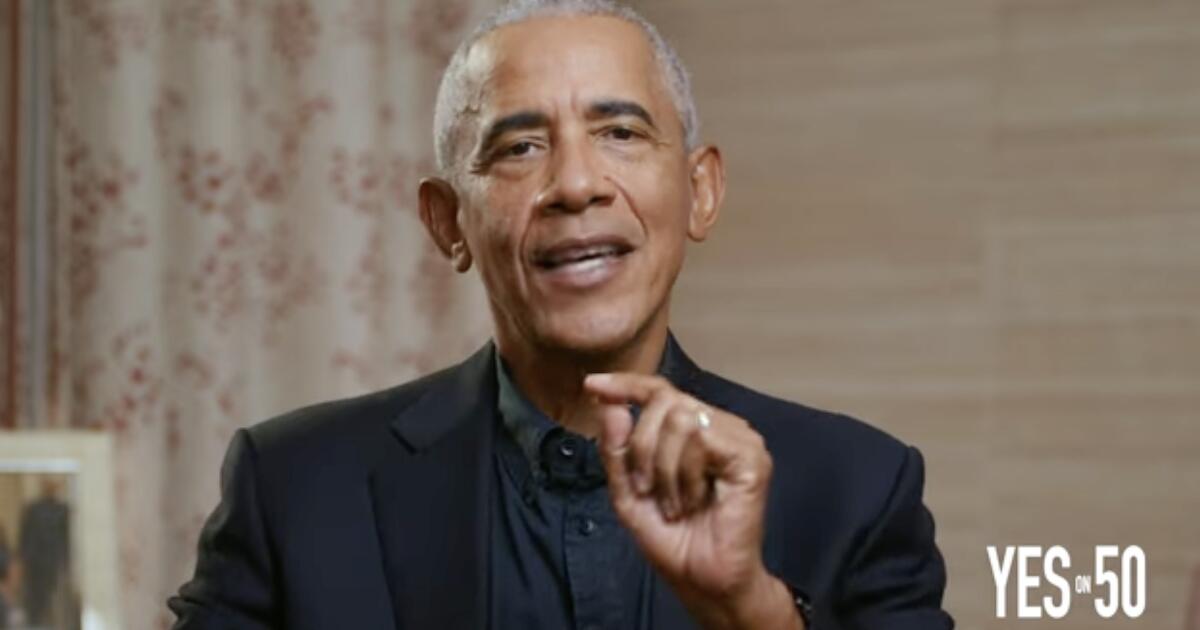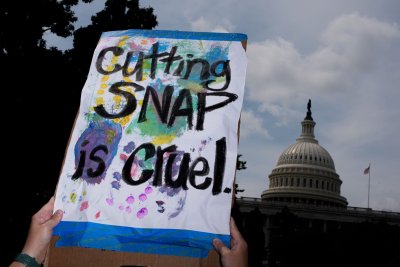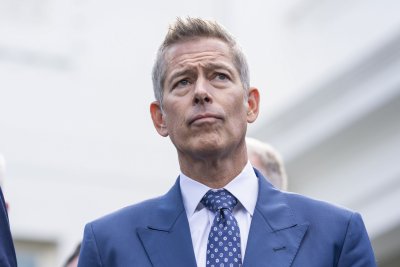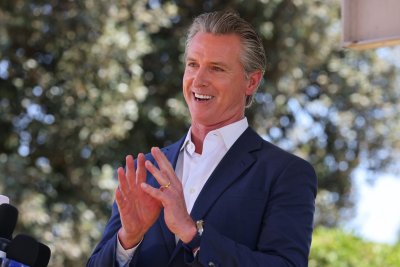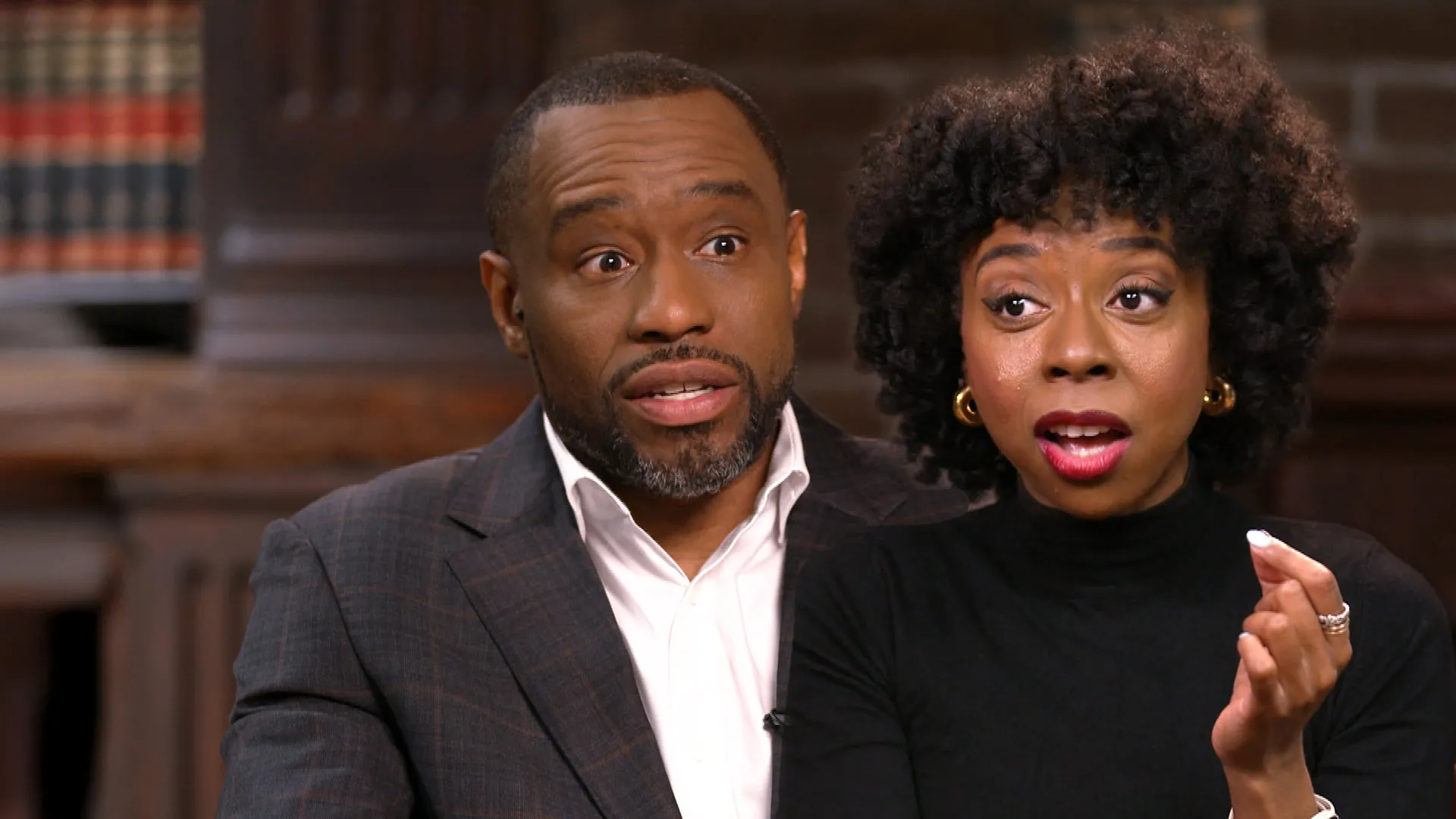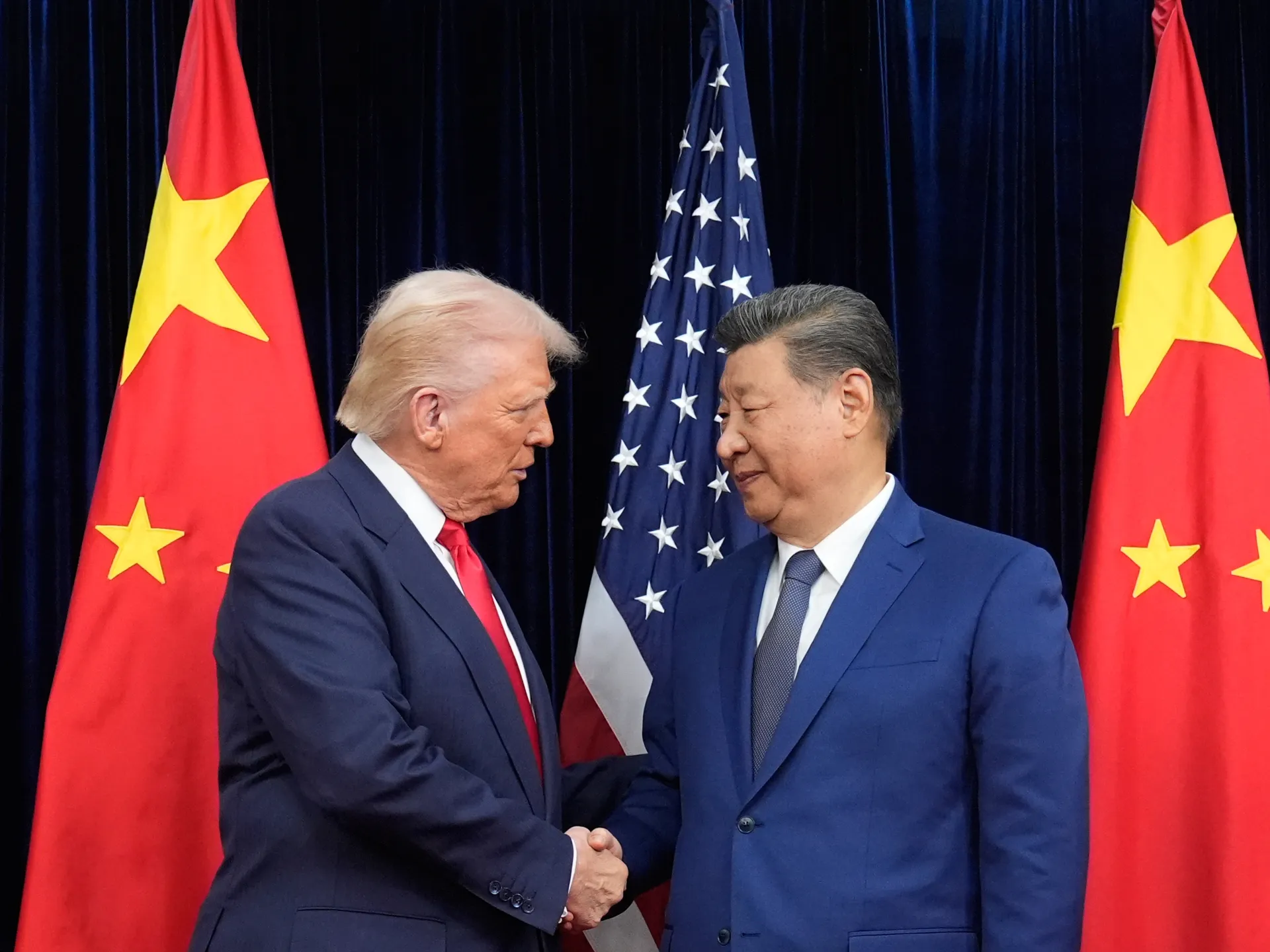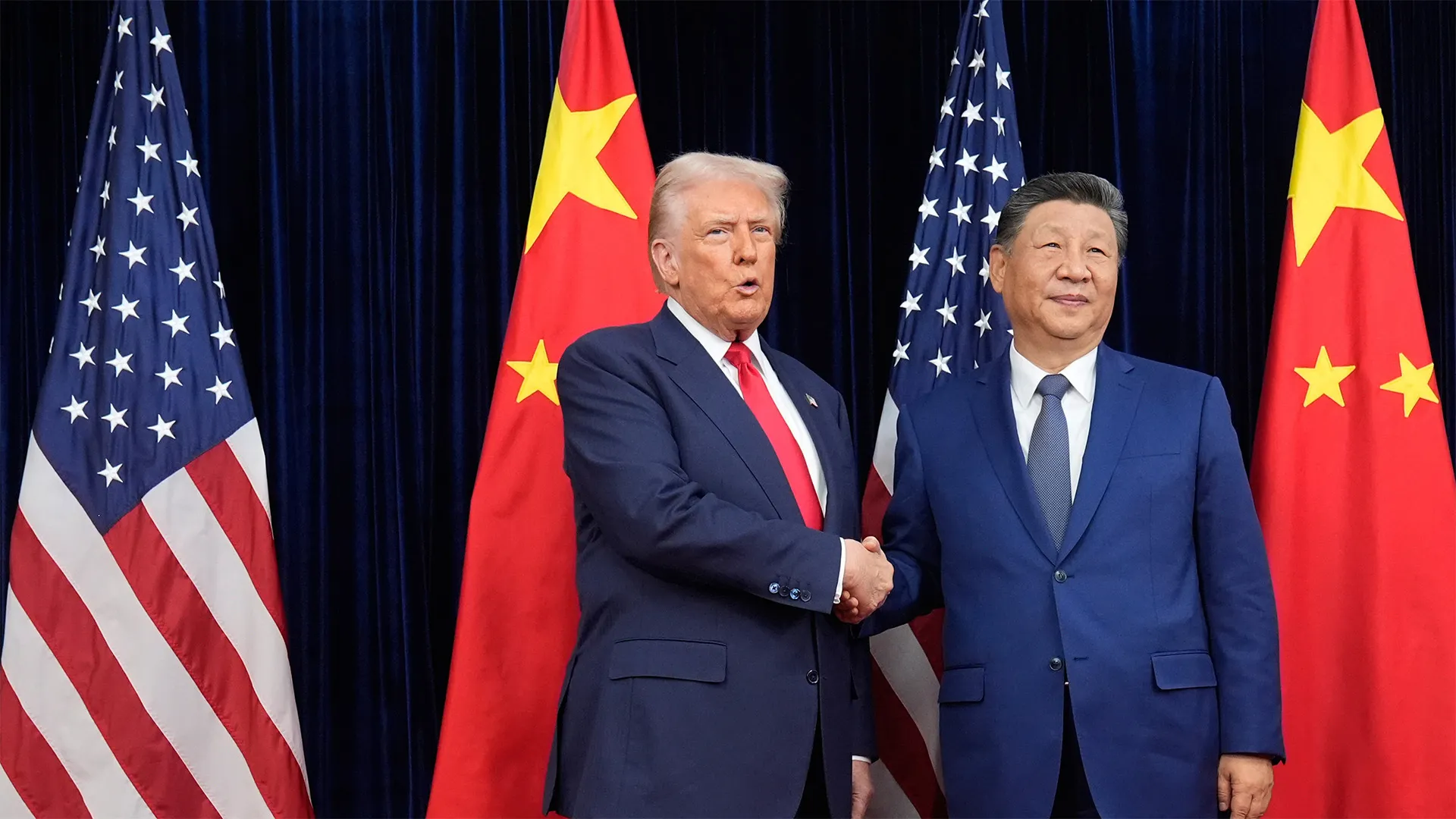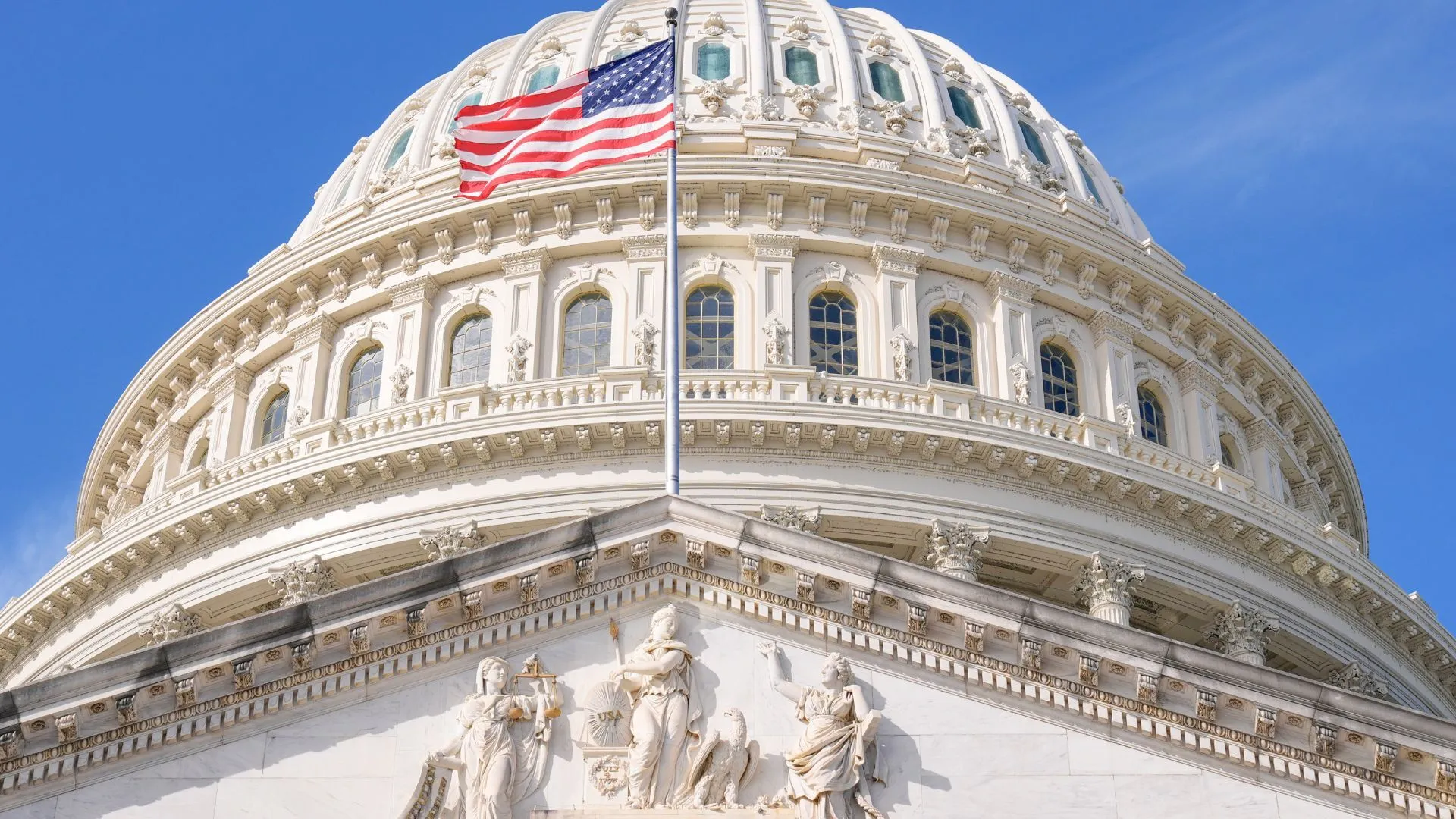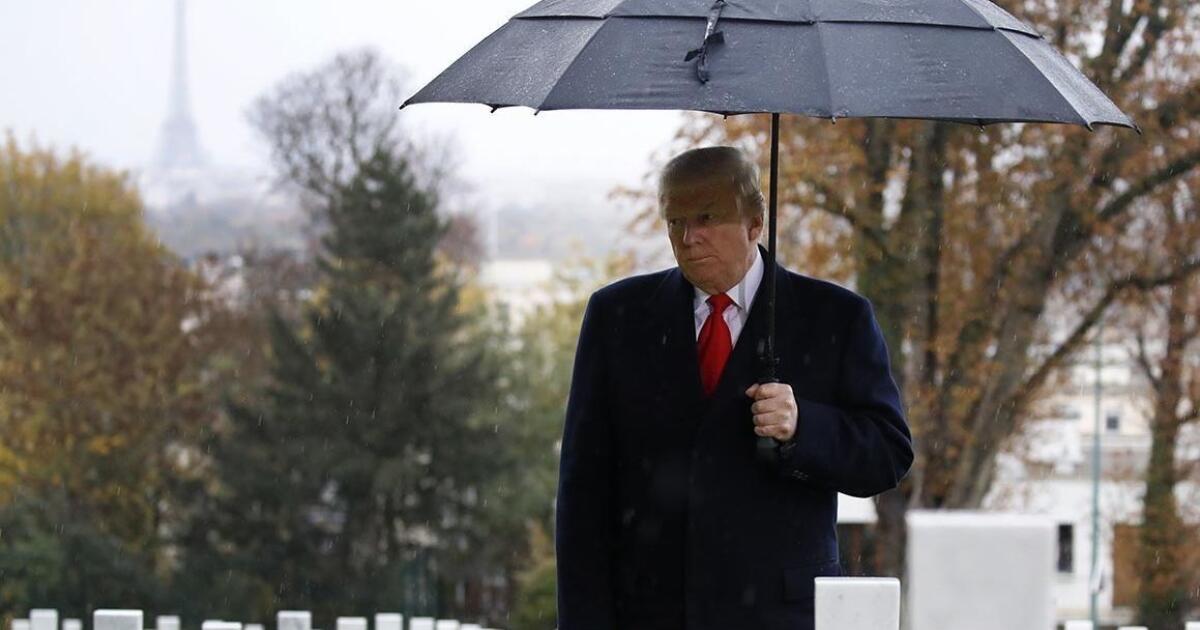Sexual misconduct allegations against Arnold Schwarzenegger roiled California’s gubernatorial recall race Thursday as the Republican apologized for having “behaved badly” toward women while insisting he would champion their cause.
Responding to a Los Angeles Times story on accusations by six women that he touched them in a sexual manner without their consent, Schwarzenegger dismissed the report as “trash politics,” but went on to acknowledge unspecified wrongdoing.
“I always say that wherever there is smoke, there is fire,” he told several hundred cheering supporters at a San Diego rally.
“So I want to say to you, yes, I have behaved badly sometimes. Yes, it is true that I was on rowdy movie sets, and I have done things that were not right, which I thought then was playful. But I now recognize that I have offended people. And to those people that I have offended, I want to say to them, I am deeply sorry about that, and I apologize.”
Asked later about the specific incidents in an interview on CNN, Schwarzenegger said: “I don’t remember so many of the things that I was accused of having done.”
Pressed further, he said: “I would say most of it is not true.”
He also sought to shift blame to his opponents. “It’s very interesting that since I’m ahead in the campaign … all the things are coming out,” he said. “I’m very pro-women. I’m very much into equality. Those things are not coming out.”
Schwarzenegger’s strategists had designed the closing part of the campaign — a four-day bus tour of the state — as a “triumphal march.” Instead, the candidate began the day apologizing for sexual misconduct. By nightfall he was sitting with his wife, responding not only to that issue, but to allegations in the New York Times and on ABC’s “World News Tonight” that he had expressed admiration for Adolf Hitler during the 1970s.
The Austrian-born actor denied the accusation and called Hitler a “disgusting villain.”
“I always despised everything Hitler stood for,” said Schwarzenegger, whose father was a Nazi. “I hate the regime, the Third Reich and all of those whole Nazi philosophy, have always fought against that.”
Political strategists differed on whether the sexual misconduct allegations might affect Tuesday’s election.
The disclosures came a day after a confident Schwarzenegger had unveiled plans for his first 100 days in office. Recent polls have shown voters inclined to toss Gov. Gray Davis from office and replace him with Schwarzenegger.
Thursday’s events made the tumultuous eight-week campaign even more volatile.
One Schwarzenegger event Thursday in Costa Mesa was disrupted when a Los Angeles woman, Gail Escobar, told reporters about an alleged confrontation with the actor many years ago.
As she spoke, an angry confrontation erupted between Schwarzenegger’s supporters and roughly half a dozen female protesters carrying signs saying: “Hey, Arnold. Stop Harassing Women Now.”
A supporter ripped in half a sign reading “No Groper for Governor.” An elderly man shouted at the protesters: “You’re too stupid to get respect!”
On a nationally syndicated radio show, Joy Browne, a psychologist, detailed an incident in the late 1970s in which she alleged Schwarzenegger had harassed her.
In Santa Monica, the disclosures dominated a campaign event by the governor at the pier aquarium. After one reporter asked Davis to comment on The Times story, another suggested ushering out the 30 Santa Clarita first-graders on hand to witness the governor’s signing of four environmental bills. The children were led from the room before questioning resumed.
Davis was careful not to gloat over Schwarzenegger’s situation. He called the allegations of groping and lewd language directed at women “a matter between the voters and their conscience.”
“I would just rather leave this matter to the voters of this state,” Davis said at the bill-signing ceremony. “They will digest it. They will decide what importance to attach to it.”
But Lt. Gov. Cruz Bustamante, the only Democratic officeholder running to replace Davis, seized on Schwarzenegger’s apology as a new weapon against his chief Republican rival.
“These charges of sexual battery and harassment are serious and recent,” Bustamante said at a Compton Community College campaign stop.
He read an excerpt from the California Penal Code, saying, “Any person who touches an intimate part of another person against the will of the person touched” is guilty of misdemeanor sexual battery.
Some Republicans, meanwhile, accused The Times of partisanship and excused Schwarzenegger’s behavior; others expressed outrage over his admission of misconduct.
“What we saw in the L.A. Times today was not an attack on Arnold Schwarzenegger,” said Rep. David Dreier (R-San Dimas). “It was an attack on every single one of us who want to take back California.”
The actor’s major Republican recall opponent, state Sen. Tom McClintock of Thousand Oaks, said he viewed the accusations “with a high degree of skepticism,” because they emerged so close to the election.
But “if true, these acts are reprehensible and inexcusable,” he said. “And as the father of a 13-year-old daughter, I’d say to him, ‘Get out of the race.’ ”
The Times article on Thursday, which was based on a seven-week investigation, quoted women as saying Schwarzenegger had groped and humiliated them in incidents as early as 1975 and as recently as 2000. Three described their surprise and discomfort when Schwarzenegger grabbed their breasts. Another said he reached under her skirt and gripped her buttocks, while another said he tried to remove her swimsuit in a hotel elevator.
Four of the women spoke on condition of anonymity. Three said they feared Schwarzenegger’s power in the entertainment industry where they worked, and the fourth said she did not want to be exposed to public humiliation. None of the women had filed formal complaints against the actor, but their accounts were confirmed by friends or relatives in whom they had confided well before the recall.
The Times did not learn of any of the six women from Schwarzenegger’s opponents in the recall campaign, and none of them approached the newspaper on her own.
E. Laine Stockton, who said Schwarzenegger had reached under her T-shirt to touch her breast at a Venice Beach gym in 1975, said Thursday that Schwarzenegger should apologize personally to each of the women.
“He didn’t do it to us as a group,” she said. “He did it to us in public places. As far as I’m concerned, I want a face-to-face apology.”A woman who had told The Times that Schwarzenegger pulled her onto his lap and whispered a lewd comment said she was upset that Schwarzenegger had coupled his apology with an attack on “trash politics.”
“It kind of discounts the apology a little bit and puts the shame on the person it happened to,” she said. “The wording seemed to suggest that what happened to me is part of some larger political scheme that’s in the gutter, even though it’s not something I did. It’s the truth about something he did.”
Another woman quoted in the Times story, a former waitress, said Thursday that the actor’s apology was too narrow. She alleged that as she waited on his table, Schwarzenegger had asked her to go into a bathroom and stick her finger in her vagina and return to him. “Not everyone he offended was on a movie set. I was a waitress refilling his coffee cup,” she said.
Although earlier asking not to be named in The Times investigation, the woman, Nicole Alpert, decided Thursday to disclose her identity. She is a motivational speaker for women and a hairdresser.
“I have chosen to pour the proverbial hot pot of coffee on his head,” Alpert said. “As a woman who speaks out for herself and other women, if somebody offends you in any way, no matter who they are — Mr. Famous Actor or Mr. Governor of California — speak up for yourself. You may find out that two things happen: One, you protect your honor and, two, you get an apology. How great is that?”
The apology came Thursday morning at the San Diego Convention Center rally, an event that kicked off a four-day campaign bus tour.
“You know when you get into politics they try to tear down your character and tear down everything you stand for, and, as you know, this morning they have begun with the tearing down,” Schwarzenegger told the crowd. “Yes, absolutely. But I know — I know that the people of California can see through these trash politics. Yes. And let me tell you something — a lot of … what you see in the stories is not true.”
But he then apologized and added: “When I’m governor, I want to prove to the women that I will be a champion for the women. A champion for the women. And I hope that you will give me the chance to prove that. Now let’s go from the dirty politics back to the future of California.”
When he finished speaking, the blue curtains behind him parted to reveal the bus that will take him on a “California Comeback Express” tour. He climbed up the steps and as the bus drove around the Convention Center perimeter, he leaned out the door, beaming and giving a thumbs-up.
Later, at a boisterous Orange County Fairgrounds rally in Costa Mesa, Schwarzenegger vowed to “destroy the car tax,” which the Davis administration has tripled to help close a multibillion-dollar budget gap.
“In the movies, when I played a character and I didn’t like someone, you know what I did? I destroyed it,” he told the crowd. “I’ll show you exactly what we’re going to do to the car tax.”
A crane then dropped a giant weight onto an Oldsmobile Cutlass, crushing the vehicle.
“Hasta la vista, car tax,” Schwarzenegger said as the rock anthem “We’re Not Gonna Take It” blasted through loudspeakers.
On Wednesday night, the Republican front-runner also was forced to respond to reports that quoted from an unpublished book proposal in which Schwarzenegger, then a bodybuilder, allegedly cited Hitler as one of his heroes.
“He came up from being a little man with almost no formal education …. I admire him for being such a good public speaker and for what he did with it,” Schwarzenegger was quoted as saying in a “verbatim transcript” of a 1975 interview he reportedly gave while making the documentary “Pumping Iron.”
At the news conference with his wife, Maria Shriver, Schwarzenegger said he could not remember making any such statements.
“I cannot imagine I’ve ever said anything favorable on those things,” he said.
The author of the book proposal, George Butler, who served as producer of the documentary, has given conflicting accounts of Schwarzenegger’s remarks on Hitler. In an interview with the Los Angeles Times two months ago, he denied Schwarzenegger had ever made such remarks. This week, however, he told ABC and the New York Times that Schwarzenegger had made the remarks.
Shriver said the sexual misconduct allegations “show why really good people don’t want to go into politics anymore.”
“I don’t get into specifics,” she said. “As I say to my children, it always takes great courage to do — stand before anybody and apologize,” she said. “I think that’s what Arnold did today. I think he handled it and his statement speaks for itself.”
Many political strategists in both parties largely dismissed the impact of The Times report, saying the late-campaign timing of the revelations, as well as Schwarzenegger’s swift apology, should mitigate the fallout. That is, they said, barring new developments that advance the story or keep it alive through the weekend.
For voters backing the recall at this point, “Heaven and Earth is not going to move them to ‘no,’ “said Gale Kaufman, a Democratic strategist who is not involved in the race.
Arnold Steinberg, a GOP strategist also watching from the sidelines, said much the same thing.
“There’s an increasing skepticism among voters toward last-minute charges in any campaign,” he said. At this late stage, “Voters look to reinforce their views and discard information that contradicts that view,” he added.
Others suggested that the revelations — if not the exact details — were hardly new or surprising. Allegations of Schwarzenegger’s untoward behavior toward women circulated widely more than two years ago in a Premiere magazine article published as the actor was weighing a run against Davis in the 2002 election.
Still, some conservative activists said the allegations could erode Schwarzenegger’s support among Republicans.
Steve Frank, a conservative leader who worked for former GOP gubernatorial candidate Bill Simon Jr., said Schwarzenegger “may have brought down the whole recall.”
“The conservatives didn’t like Bill Clinton for doing this, and we would be hypocrites to approve of Schwarzenegger doing this,” he said.
Meanwhile, a new accusation surfaced from Escobar, 41, a Los Angeles wife and mother and a waitress at a restaurant in the Fairmont Miramar hotel in Santa Monica. In an interview with The Times, she said Schwarzenegger had threatened to assault her when she was a teenager in the late 1970s.
Her account could not be independently confirmed. She was accompanied to the event by fellow members of the Hotel Employees and Restaurant Employees Union, which opposes Schwarzenegger in the election.
When she was a 16-year-old student at Santa Monica High School — then named Gail Kay — she and a school friend were drinking coffee and smoking cigarettes at a coffee shop across from the school.
They were sitting at the counter when Escobar’s friend noticed that Schwarzenegger and another bodybuilder were there. After the two men finished eating, Schwarzenegger left the restaurant but the other bodybuilder came over to Escobar and said Schwarzenegger wanted to see her, Escobar said.
“I told him if Arnold wants to see me, he can come back inside and see me,” Escobar said. “He then proceeded to pick me up out of my seat and drag me out of the restaurant, through the lobby to the parking structure.”
Escobar said her friend was amused by this and followed voluntarily. The other man held Escobar there until a vehicle pulled up, she said. Schwarzenegger was in the passenger seat, she said. He “rolled down the window and said, ‘We are going to rape you girls tonight,’ ” according to Escobar. “Then the bodybuilder who was holding me let me go and I ran. At that age, I was scared. Looking back today, I’m infuriated.”
*
Times staff writers Mark Z. Barabak, Gary Cohn, Richard Fausset, Scott Glover, Matea Gold, Gregg Jones, Matt Lait, Joel Rubin, Robert Welkos and Nancy Vogel contributed to this report.
*
(BEGIN TEXT OF INFOBOX)
Text of Schwarzenegger’s Response to Allegations
“You know when you get into politics they try to tear down your character, and tear down everything you stand for. And as you know, this morning they have begun with the tearing down. Yes. Absolutely.
“But I know — I know that the people of California can see through these trash politics. Yes. And let me tell you something — a lot of those, what you see in the stories is not true. But at the same time, I have to tell you, I always say wherever there is smoke, there is fire. That is true.
“So I want to say to you, yes, I have behaved badly sometimes.
Yes, it is true that I was on rowdy movie sets, and I have done things that were not right, which I thought then was playful.
“But now I recognize that I have offended people. And to those people that I have offended, I want to say to them I am deeply sorry about that, and I apologize, because this is not what I tried to do.
“When I am governor, I want to prove to the women that I will be a champion for the women, a champion of the women. And I hope that you will give me the chance to prove that.
“Now let’s go from the dirty politics back — to the future of California.”








